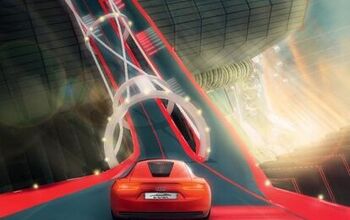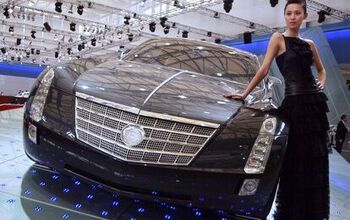Audi Approved for $3.3 Billion EV Factory in China

Audi and FAW Group, the state-owned partner it is effectively required to have in order to preferential treatment from the Communist Party of China, received some good news this week. Government officials have approved the duo for a new, jointly operated production facility in Changchun.
With Volkswagen Group having shifted its focus toward China in recent years, the market has become all-important for the German company. VW is currently the top-selling brand for the entire region, with its Audi subsidiary typically being the highest volume premium automaker from Europe. Building in China is good optics for brands hoping to remain popular there and has the added benefit of placing manufacturing complexes closer to relevant suppliers, especially if you’re swapping to electric vehicles.
Decades of allowing foreign entities to make use of its cheap labor force and lower regulatory standards have allowed for component consolidation, paving the way for factories responsible for producing more complex items with higher margins. China now exports essential parts for most major automakers and has become the world’s largest battery exporter by far. Considering the number of companies that are keen to rebrand themselves as green, clean, purveyors of all-electric transportation, the timing couldn’t be more perfect.
Though it also has some downsides.
Volkswagen Group’s Chinese production ties have resulted in accusations of the company directly benefiting from slave labor. The worst of this came in 2020 after the company was chastised for having a facility in Xinjiang where the Chinese government has forcibly detained millions of Uyghurs (a primarily Muslim ethnic minority) at reeducation facilities and work camps. With VW’s foundation being steeped in the anti-Semitic policies of the National Socialist German Workers’ Party (NSDAP), one would think the company would be extra careful not to utilize political prisoners as a source of labor. But Volkswagen actually hasn’t suffered all that much from the decision, save for some bad publicity, and has no intention of changing tactics.
“We have made it clear that we must stand by our commitment in China as a whole, and we will also stand by our commitment in Xinjiang as long as we believe that it is economically feasible,” Stephan Wöllenstein, CEO of Volkswagen Group China, was quoted as saying by Der Spiegel in 2021.
According to Reuters, the companies will be investing a total of 20.93 billion yuan ($3.29 billion USD) for the facility. Local planning regulators have approved the groundbreaking for April of 2022 and completion is tentatively scheduled for 2024. Audi said it would ideally like to see production commence before the year was over. But the facility is already behind schedule after alleged bureaucratic hang-ups attributed to regulators.
From Reuters:
The plant will start production in December 2024 and have the capacity to manufacture 150,000 cars a year, according to the regulator. Its statement also showed the approval was given on Feb. 11, and that the venture plans to produce three electric models, including Audi’s e-tron SUV.
“The Audi FAW NEV project is an important cornerstone of Audi’s electrification strategy in China,” a Volkswagen spokesperson said, confirming the approval.
“We are consequently pushing forward the relevant works in this project. The construction of the plant is planned to start in the second quarter of 2022.”
Audi and FAW collaboratively manufacturer combustion vehicles in Changchun already. The duo signed in October of 2020 to jointly produce premium EVs in China, with the new facility representing the fruit of those efforts.
[Image: JL IMAGES/Shutterstock]

A staunch consumer advocate tracking industry trends and regulation. Before joining TTAC, Matt spent a decade working for marketing and research firms based in NYC. Clients included several of the world’s largest automakers, global tire brands, and aftermarket part suppliers. Dissatisfied with the corporate world and resentful of having to wear suits everyday, he pivoted to writing about cars. Since then, that man has become an ardent supporter of the right-to-repair movement, been interviewed on the auto industry by national radio broadcasts, driven more rental cars than anyone ever should, participated in amateur rallying events, and received the requisite minimum training as sanctioned by the SCCA. Handy with a wrench, Matt grew up surrounded by Detroit auto workers and managed to get a pizza delivery job before he was legally eligible. He later found himself driving box trucks through Manhattan, guaranteeing future sympathy for actual truckers. He continues to conduct research pertaining to the automotive sector as an independent contractor and has since moved back to his native Michigan, closer to where the cars are born. A contrarian, Matt claims to prefer understeer — stating that front and all-wheel drive vehicles cater best to his driving style.
More by Matt Posky
Latest Car Reviews
Read moreLatest Product Reviews
Read moreRecent Comments
- Probert They already have hybrids, but these won't ever be them as they are built on the modular E-GMP skateboard.
- Justin You guys still looking for that sportbak? I just saw one on the Facebook marketplace in Arizona
- 28-Cars-Later I cannot remember what happens now, but there are whiteblocks in this period which develop a "tick" like sound which indicates they are toast (maybe head gasket?). Ten or so years ago I looked at an '03 or '04 S60 (I forget why) and I brought my Volvo indy along to tell me if it was worth my time - it ticked and that's when I learned this. This XC90 is probably worth about $300 as it sits, not kidding, and it will cost you conservatively $2500 for an engine swap (all the ones I see on car-part.com have north of 130K miles starting at $1,100 and that's not including freight to a shop, shop labor, other internals to do such as timing belt while engine out etc).
- 28-Cars-Later Ford reported it lost $132,000 for each of its 10,000 electric vehicles sold in the first quarter of 2024, according to CNN. The sales were down 20 percent from the first quarter of 2023 and would “drag down earnings for the company overall.”The losses include “hundreds of millions being spent on research and development of the next generation of EVs for Ford. Those investments are years away from paying off.” [if they ever are recouped] Ford is the only major carmaker breaking out EV numbers by themselves. But other marques likely suffer similar losses. https://www.zerohedge.com/political/fords-120000-loss-vehicle-shows-california-ev-goals-are-impossible Given these facts, how did Tesla ever produce anything in volume let alone profit?
- AZFelix Let's forego all of this dilly-dallying with autonomous cars and cut right to the chase and the only real solution.


































Comments
Join the conversation
The push for EVs is going to hit a road block coming very soon. Lithium is running out and it's not a matter of mining it it's just not there. Some estimates say that Lithium supplies will be depleted by 2030. Hmm, A couple of weeks ago, I mentioned something to the effect that lithium (like petroleum) is a FINITE resource.
No issue with EVs generally. My concern is that they are essentially coal powered, since that's primarily how we are still generating electricity. They are also too costly and impractical for the lower demographics. Not many apartments dwellers in da 'hood, for example, are going to have access to a charger. So they seem to me to be somewhat of an elite virtue signaling thing at this juncture. At a minimum, you would like to see American jobs being generated by this, not further manufacturing in China. I would also like to see more development of electric semis, as low income areas tend to bear the brunt of diesel pollution related to shipping.